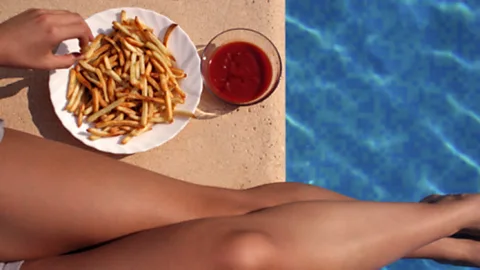Should you wait an hour after eating until swimming?

 Thinkstock
Thinkstock
We are told taking a dip on a full stomach is dangerous because we might get cramp or a stitch, or even drown. But is there any truth to this?
I can still remember how slowly time seemed to pass as a child when I was on the beach, and had to wait an hour after I’d finished my sandwiches before I was allowed back into the sea. The reason, I was always told, was that swimming on a full stomach is dangerous because you might get cramp or a stitch, leaving you unable to swim, and this could result in drowning. But is there any truth in it?
The causes of are cramp still aren’t fully understood, as I’ve discussed previously. There’s no evidence to suggest that exercising after eating gives you cramp, but what we do know is that vigorous exercise directs blood flow away from the digestive area to the skin and to the muscles in your arms, legs and skin. So, if your food is still half-digested this could make you nauseous. It’s the same reason that extreme fear makes you feel sick. The fight-or-flight response abandons less-urgent processes like digestion, diverting blood flow to the muscles so that you can defend yourself physically, or run faster than you ever have before.
But these studies on cramp involved athletes taking part in long-distance running or even triathlons – involving a lot more vigour and endurance than the kinds of splashing about kids are more likely to do on holiday. Professional swimmers are careful not to race on a full stomach, but they do ensure that they have eaten enough to provide the fuel needed for them to perform at their best. When endurance swimmers undertake very long distances they even consume food during the race. If they do experience cramp, it’s more a result of overexertion, it doesn’t seem to be related to food.
So how about a stitch? Although this can feel like cramp, researchers differentiate between the two. Despite having been given the medical name of “exercise-related transient abdominal pain”, stitches are still not fully understood. In Australia sports scientist Darren Morton has devoted his research career to the subject of the stitch. He’s found that elite swimmers are even more prone to getting a stitch than runners. People who had eaten a large meal between one and two hours before a race were more likely to get a stitch, even though they had waited the requisite hour before exercise. (He does have one bit of good news, though – the older you get, the rarer they become.)
Data dip
But there is one theory that could explain exercise-related stitches. Morton noticed that many long-distance runners found they got a stitch in a race not long after visiting a drinks station to rehydrate. He decided to do an experiment, in which people were required to drink far larger amounts of fluid than usual just before they exercised. Those who drank reconstituted fruit juice were more likely to feel bloated and to get a stitch. He speculates that the juice bloats the stomach, putting pressure on the parietal peritoneum, the outer layer of the abdominal wall. This is an area that is particularly sensitive, which could explain the pain of a stitch. If a bloated stomach can irritate the area and cause a stitch, then in principle food could do the same.
Back to the water, if you do succumb to a stitch or to cramp, is there any evidence that it would cause you to drown? If a child is in shallow water they can stand up. It’s even possible to float on your back with a stitch. A child would only be in danger if they were in deep water, far from anything to grab onto, without being good enough at swimming to float – a situation which is inadvisable, whether you’ve just eaten or not.
If you look at the statistics, many children do die of drowning worldwide every year. In China it’s the leading cause of accidental death in children. However, eating does not feature as a contributory factor. The US Centers for Disease Control, for instance, lists the main risks as the inability to swim, the lack of fencing around pools, lack of supervision. In adults, another major cause is drinking alcohol before swimming.
Regardless, there are other good reasons not to encourage swimming straight after lunch – avoiding feeling sick and staying out of the sun while it’s at its hottest in the early afternoon, for example. So telling kids they might drown because they’ve just eaten is one way of getting them to listen to you. But from the evidence, it doesn’t appear to be backed up by science.
If you would like to comment on this article or anything else you have seen on Future, head over to our Facebook page or message us on Twitter.
You can hear more Medical Myths on Health Check on the BBC World Service.
Disclaimer
All content within this column is provided for general information only, and should not be treated as a substitute for the medical advice of your own doctor or any other health care professional. The BBC is not responsible or liable for any diagnosis made by a user based on the content of this site. The BBC is not liable for the contents of any external internet sites listed, nor does it endorse any commercial product or service mentioned or advised on any of the sites. Always consult your own GP if you're in any way concerned about your health.
